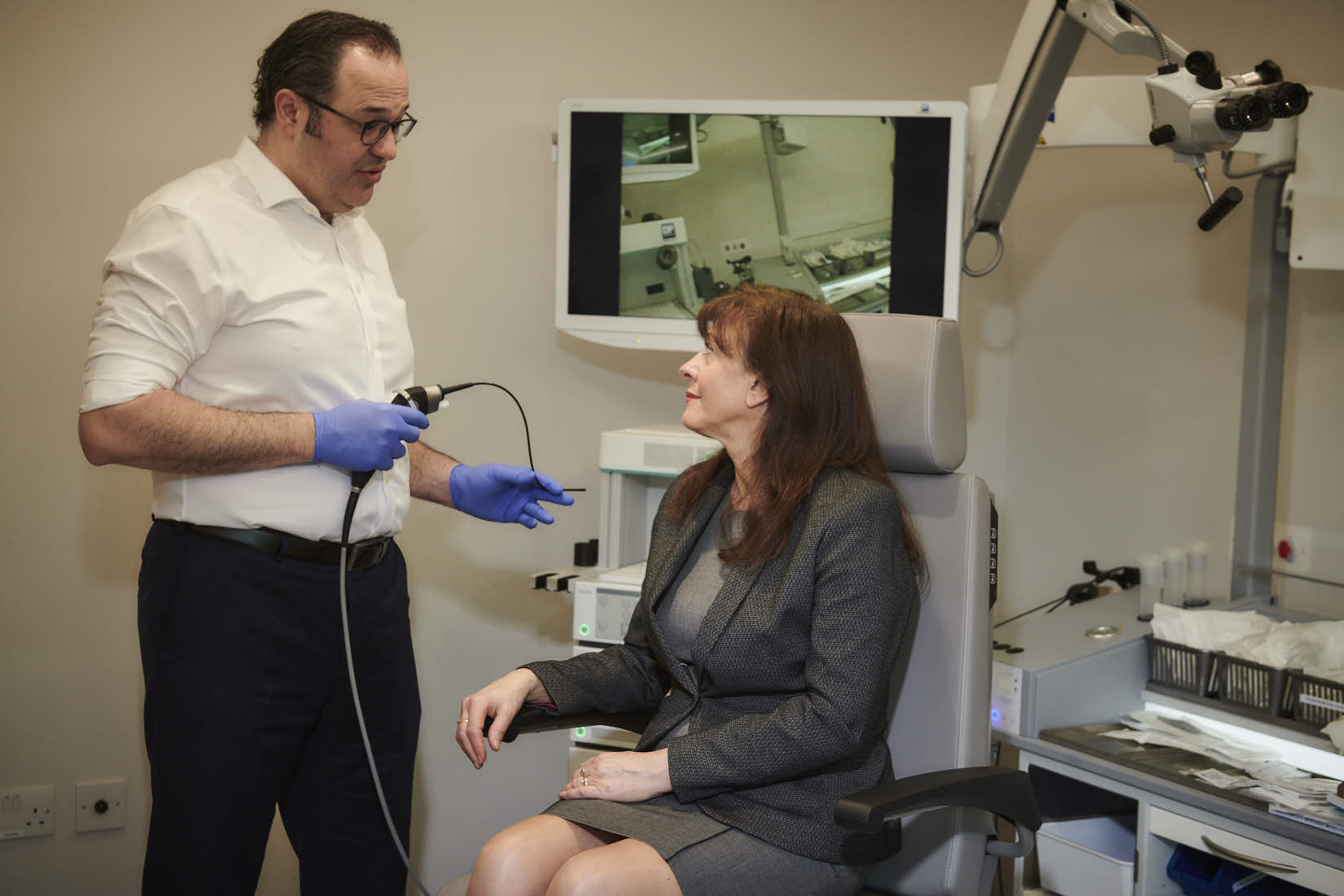Miss Nora Haloob
Consultant ENT Surgeon
Specialist expertise: Rhinology, Ear, Nose and Throat.
Anosmia is the temporary or permanent loss of the sense of smell. Smell can also be partially reduced, or distorted Recovery is dependent on the identification and successful treatment of the underlying cause.

Anosmia is the medical term for the complete loss of sense of smell. Hyposmia is a reduction in the sense of smell. Depending on the cause, anosmia can be temporary or permanent, which can have a significant impact on your quality of life.
Without a sense of smell, as well as not being able to identify scents, you may find that food tastes bland or that it’s hard for you to tell foods apart. This can lead to a loss of interest in food, which in extreme cases can lead to poor nutrition, weight loss and even depression.
Some people with anosmia will add more salt to bland foods to elevate flavours, which can also be a problem if you have high blood pressure or kidney disease.
Having a good sense of smell also plays a critical role in keeping yourself safe, for example, in cases of detecting spoiled foods, smoke or gas leaks.
If you’re affected by anosmia, it’s important to seek medical help to identify the cause and initiate treatment so you can keep yourself safe, well and happy.
Loss of smell can occur gradually or suddenly. Some patients may also experience an altered sense of smell (parosmia), often triggered by certain foods or drinks, or experience smells when there is no obvious odour present (phantosmia).
Your sense of taste may also be reduced, as your perception of flavour is dependent upon your sense of smell.
Where loss of smell is caused by rhinitis or sinusitis, you may also have symptoms like nasal blockage, facial pain and pressure or discharge.

Anosmia is a common side effect of many conditions that cause irritation and congestion in the nose, such as:
viral infection, including the common cold, influenza (flu) and COVID-19
acute sinusitis
chronic sinusitis, with or without nasal polyps
allergic rhinitis (hay fever)
non-allergic rhinitis
Damage to your brain or nerves can also affect the brain's ability to detect smells. Factors and conditions that may have this effect include:
ageing
head injuries
brain aneurysm, injury, surgery or tumours
exposure to certain chemicals
certain medications
poor nutrition
radiotherapy
schizophrenia
zinc deficiency
Anyone of any age can be affected by temporary anosmia, but permanent or longer-lasting loss of smell is more common in those over the age of 50.
In very rare cases (around 1 in 10,000 people), anosmia is congenital (present at birth). Being born with anosmia is either due to an inherited genetic disorder or abnormal development of the olfactory system (the sensory system responsible for smell), and there is unfortunately no cure for this.

Certain viruses can damage the olfactory sensory neurons – the nerves that help you smell – and it can take them months to recover. In the case of COVID-19, more than 80% of infected people will temporarily lose their sense of smell, and some people also lose their ability to taste.
While most people regain this sense of smell within 60 days of recovering from COVID-19, some are unable to smell for a much longer time. It’s important to see an ear, nose and throat (ENT) specialist if you haven’t regained your sense of smell more than 60 days after contracting COVID-19, as treatment may be required to help restore it.

At Welbeck, diagnostic investigations of anosmia are carried out by our ENT specialists. During a consultation, your consultant will ask you about your symptoms, examine your nose and run tests to evaluate the extent of your condition. If there is no clear cause for your loss of smell, they may also send you for a CT or MRI scan to look for structural abnormalities in your sinuses.
It isn’t always possible to prevent loss of smell, but there are steps you can take to reduce the risk:
treat allergies and sinus problems promptly
protect yourself from colds, flu and other infections
avoid smoking and limit exposure to strong fumes or pollutants
seek medical advice for nasal injuries or blockages
maintain good overall health and nutrition
Loss of smell can affect your daily life in several ways:
food may taste bland, which can reduce your appetite
it can be harder to notice dangers such as smoke, gas leaks or spoiled food
missing familiar scents may cause frustration or low mood
social situations, such as eating out, may be less enjoyable
for some, it may also affect work or hobbies that rely on smell
The best treatment for your loss of smell depends on the underlying cause.
For example, nasal polyps are usually treated with topical steroid drops and/or oral steroids, and allergic rhinitis can be treated with antihistamines and topical steroid sprays.
Similarly, if your anosmia is caused by a condition that affects the brain or nerves, appropriate treatments may reduce the extent of your loss of smell.
If your anosmia is caused by a blockage, surgery may sometimes be recommended.
In addition to these treatments, some individuals can regain their sense of smell through therapies like smell training.
A specialist consultant at Welbeck will be able to help diagnose anosmia, identify the cause and recommend the most effective treatment for you.

PRP (platelet-rich plasma) injections are commonly used as a medical treatment to encourage the body’s healing ability. While most commonly used as a therapy for musculoskeletal conditions and injuries, research has found that PRP injections can be effective in treating COVID-19-induced anosmia.
The treatment involves taking a sample of your blood and spinning it in a centrifuge to separate plasma and platelets from the other components. The platelet-rich plasma is then drawn up into a fine needle or soaked up on a swab before being injected or applied inside your nose, where the smell receptors are located, to encourage healing and restore the sense of smell.

Many temporary causes of anosmia can be treated, but in some cases, there is no cure and the sense of smell cannot be restored.

At Welbeck, our ENT specialists are experts in their field and are dedicated to providing world-class care to every patient.
With access to colleagues across other specialities, our consultants are also able to refer within the Welbeck ecosystem if needed to ensure you receive the best possible treatment as quickly as possible, all under one roof.
All appointments, testing, treatment, and follow-up appointments take place within our state-of-the-art facilities, enabling us to deliver accurate diagnostics and advanced treatments.
Your health is important to us, so we strive to offer same-day appointments whenever possible.
Our consultants are recognised by the major health insurance companies. If you have private health insurance, your treatment at Welbeck can begin once you have obtained authorisation. We also provide care to self-paying patients. Learn more about the different payment options at Welbeck.
Get in touch today to book an appointment.
Loss of smell can last for just a few days, or it can last for weeks, months, or even be permanent.
Anosmia is relatively common, affecting 1-5% of those under the age of 60 and at least 20% of those aged 60 or over at some point.
How long a PRP injection can be effective varies from person to person, but trials have shown that the treatment can have a benefit for up to 12 months from the start of treatment.
As PRP injections use your own blood, they are very safe and the treatment carries a low risk of complications and infection.
Currently selected day
Available consultations
All our private ENT specialists at OneWelbeck in London are leaders in their sub-specialties, providing the highest quality treatment to ensure you receive the best available care.